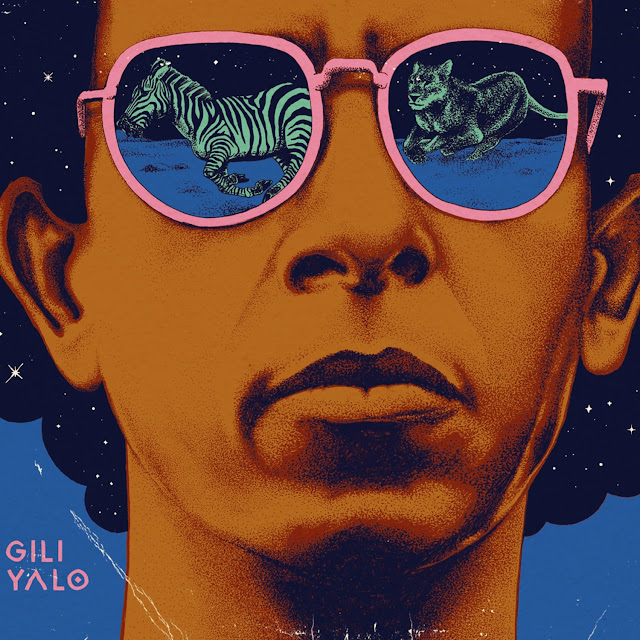Gili Yalo - Gili Yalo
He is 36 years old, was born near Gondar, in Ethiopia, and lives in Tel Aviv, in Israel. Like so many other children in the Ethiopian diaspora, she had to go a long way into exile. When he was 4 years old, his parents ventured out of Ethiopia in the famous Operation Moses, a secret rescue of the Mossat, the Israeli intelligence service, which evacuated about 8,000 Ethiopians through a lengthy journey through Sudan to board secret flights. that left from Khartoum. Today, Gili Yalo is one of the names in Israel's emerging music scene, and his Ethiopian roots play a strong role in his sound, which he has regained on his recent return to the country where he was born. We were with him during the last Gibraltar World Music Festival, and we were able to learn more about this artist, as well as about the Falashas, or Ethiopian Jews.
When being a Jew he saved the Ethiopians from famine:
Marxist President Mengistu Haile Mariam had banned the practice of Judaism and the teaching of Hebrew in Ethiopia, and famine was hitting millions, pouring thousands into neighboring countries. “The history of the Jews in Ethiopia goes back more than 2,000 years. It was 1984 and there were rumors that if we could get to Sudan, the Israeli government would move us to Israel. For us Jerusalem meant a land of milk and honey, and a place of spirituality. So we walked for months with other Ethiopian Jewish families, "says Gili Yalo.
The singer and songwriter is today part of a community of about 140,000 Jews of Ethiopian origin living in Israel, most of whom came to the Promised Land through Operation Moses or Operation Solomon, in 1991, where near than 14,500 people were transferred to Israel in less than 36 hours. For many, this maneuver by the Israeli government was a strategy to reinforce the Jewish settlements in the country, founded in May 1948. For the Ethiopians, it was a salvation from the humanitarian catastrophe that claimed close to a million lives and converted the country a symbol of poverty and hunger forever. Although Gili vaguely remembers that journey, he says that there is the genesis of his career. “I spent most of the journey on the back of my father, singing. And many people approached my parents professing that I would be a singer, "explains Gili.
Gili Yalo's "making off":
The Yalo family was lucky. But the flight through Sudan was not without murder, rape, disease, starvation, robbery and separation from loved ones, which created bitter memories among the Ethiopian community. “Already in Israel, when I was 9 years old, I joined the school choir. And with them I went on a tour of France ", explains the musician. After several years in the choir, he had to do his military service at eighteen. “I didn't want to wield a gun, and they almost got me in prison for it. But I managed, although it is not very usual, that they let me be part of the military band ".
After finishing his military service, Gili Yalo joined the Zvuloon Dub System group. Being one of the most mythical reggae bands in the country, its presence makes Amharic, along with English, become symbols of multiculturalism in Israel. “When I started singing in Amharic I felt uncomfortable. I was very ashamed to use my mother tongue in Israel. I was very cautious when it came to showing my roots, “confesses Gili. "It was one thing to show my origin in fashion, in my clothes ... and another was to sing in Amharic," says the young man, well aware of the discrimination and racism that the Ethiopian community suffers in Israel. However, the band's message was peace, love, solidarity and equal rights for all, which, in such a controversial country, was absolutely necessary.
“It was clear to me when at a concert we did a cover of the song 'Tenesh Kelbe Lay', by Muluken Mellesse, an Ethiopian singer and drummer. The public went crazy, although they did not understand Amharic ", explains Gili Yalo. "That made me very proud of my roots, and I started to wonder why I didn't do more of that style." Zvuloon Dub System began to delve into Ethiopia's rich sonic tradition, and little by little, Gili found himself more and more comfortable in a style that had sounded in his home since childhood.
Mixing his different influences and rich cultural background, Yalo finds a personal path to artistic expression. In it, Reggae, Hip-Hop, Dancehall, Jazz, Blues, Funk, Rock and Ethio-jazz are part of the inexhaustible sources from which he drinks, creating a very interesting eclectic style. “So, about two years ago, I decided to start a solo project, like Gili Yalo. I started to act and record some sessions, and it seemed to me a wonderful and fascinating journey, in which I am still immersed ", acknowledges the Ethiopian-Israeli, who has not yet given birth to his first album.
Claiming African roots in the state of Israel:
“When I started writing songs I didn't want to write about love, it was something too private. I wrote from my feeling as an Ethiopian in Israel. Rather political and social songs, "explains the singer, who acknowledges having felt discriminated against for being of Ethiopian origin throughout his life. “Whatever you do, even if you live in Israel, you are Ethiopian. Your parents have raised you as an Ethiopian, because they live in an environment of Ethiopian culture. Until about twenty-five years old, he struggled to be considered an Israeli. But there comes a point in your life that you realize that you are not just from Israel. And that you are both, "says Gili, claiming a hybrid and personal identity.
Like the Yalo family, tens of thousands of undocumented African immigrants, mostly Eritreans and Sudanese, have settled in Israel for decades. Fleeing poverty or violence, most have risked their lives crossing the Sinai desert on foot, and in the worst case, falling into the clutches of human trafficking gangs. But the Israeli state erected a wall in 2012 along the border with Egypt, drastically reducing the number of new arrivals, and a refugee detention center, Holot Camp, operational since 2014. The country's right wing argues for the need to preserve the "Jewish identity", whatever that means to them, of the State of Israel. In addition, since mid-2016, the state has offered free cash and flights to African asylum seekers who agree to return home or fly to other African countries, and obliges entrepreneurs who have contracted African migrants to give up part of their salary in the form of taxes to pay this return.
A reference for many of these Africans, Jews and non-Jews, settled in Israel, Gili Yalo is clear about the need to know and carry their origins with pride. “There is something very important that we must understand. Without roots, like trees, we can sink very fast. But if you have well-established roots, it doesn't matter what they tell you or what they do to you. You have to understand each other's history and culture. Carry it with yourself ", confesses the musician, who continues to investigate and discover, on a journey of inner self-discovery, Ethiopian culture.
“I was in Ethiopia two months ago, for the first time since I was a child. It was a real shock, albeit in a very positive way. And now I am absolutely obsessed with knowing more. I want to go back, and come back again, again and again. It has been wonderful to reconnect with my country of birth ”, confesses Gili, who wants to continue exploring Ethiopian cultural diversity and the different forms of diaspora that Ethiopia has generated outside and within Africa.
Immersed in the recording of his first album, Gili Yalo also advances that it will not only contain an exploration of Ethiopian musical roots, or of political and social issues. “Little by little I have been daring more with more personal issues, such as disappointment in love. So my first album will have these two themes: roots and love, which at the end of the day are the same for me ", reveals the ex-husband of the Ethiopian-Israeli singer Ester Rada and collaborator of producers of the stature of Beno Hendler (Balkan Beat Box) and Uri Brainer Kinrot (Boom Pam).
VINYL RIP
A
A1 Tadese 2:53
A2 Selam 3:50
A3 Sab Sam 4:40
A4 Africa 4:58
A5 Hot Shot 3:28
B
B1 Coffee 4:56
B2 City Life 4:05
B3 Fire 3:51
B4 Tebik'Ew 4:57
B5 New Life 3:37
















